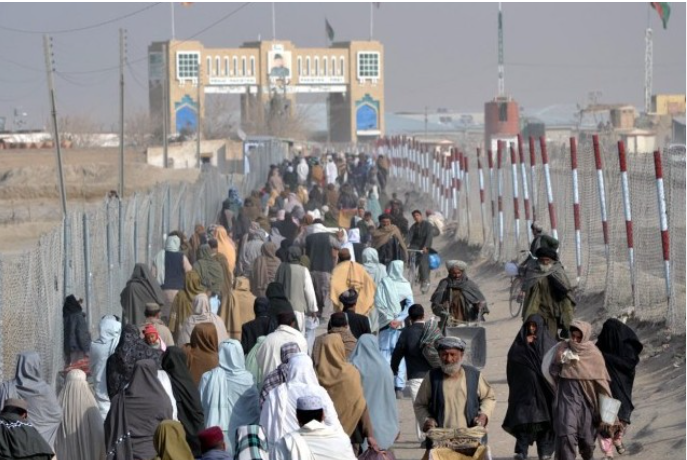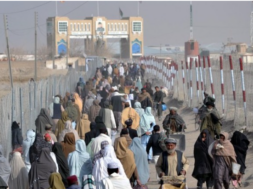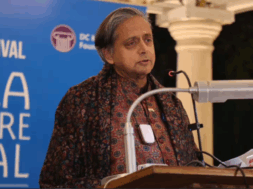
Roving Periscope: Amid Taliban’s protest and threats, Pak deports 170,000 Afghans
Virendra Pandit
New Delhi: Islamabad, which is shedding tears over the plight of fellow Muslim Palestinians of the Hamas-ruled Gaza Strip amid its war with Israel, has itself deported nearly 170,000 ‘unregistered’ poor Afghan refugees in about two weeks, despite the Taliban’s threats and approaching winter.
The media reports, quoting Pakistan’s border officials, said that over 6,500 Afghan nationals left Pakistan through the Torkham border on Sunday. With this, the total number of repatriated Afghans since mid-September has risen to over 170,000. An estimated 1.7 million Afghan refugees live in Pakistan, most of whom are ‘unregistered.’
Their ‘voluntary evacuation’ has been going on since the government served an ultimatum to all unregistered foreign nationals to leave Pakistan by November 1, warning them of legal action after the deadline. Islamabad had already bulldozed several Afghan refugee camps, leaving them no option and forcing thousands of panicked people and their families to flee as winter closed in on the two neighboring countries.
A total of 174,358 Afghan nationals left for Afghanistan since September 17, said the Dawn newspaper, adding that voluntary repatriation was still underway, but the number was dropping with each passing day.
“There was a huge number of illegal immigrants at the border crossing soon after the deadline expired. It is now coming down,” an official said.
According to official data, 6,584 Afghans, including the elderly, women, and children, exited Pakistan on Sunday.
On Saturday, 209 deportees from different prisons across Khyber Pakhtunkhwa and Punjab were sent back along with 46,936 men, 35,507 women, and 85,331 children.
On November 3, 148 deportees, 44,718 men, 33,699 women, and 82,221 children were repatriated, while the number stood at 24 deportees, 40,899 men, 30,399 women, and 76,675 on November 2.
Around 7,195 families, with 34,639 men, 25,710 women, and 68,280 children, besides 115 deportees, were repatriated on November 1.
Apart from the voluntary repatriation, Afghan nationals imprisoned for involvement in petty crimes were also being deported, the official data said.
Over 500 prisoners from Khyber Pakhtunkhwa, Punjab, and Islamabad were deported between November 1 and 4.
According to official numbers, 194 prisoners were transported from different districts of Punjab to the Torkham border crossing for repatriation.
On Saturday, around 700 Afghan nationals also returned through the Chaman border, Caretaker Information Minister Jan Achakzai said.
Addressing a press conference with Quetta Commissioner Hamza Shafqaat on Sunday, he said that over 54,000 Afghans have returned to their homeland.
To convince the refugees, officials have also assured Afghan families that the government will bear all expenses for repatriation, the reports claimed.
However, international human rights bodies have criticized Pakistan’s move to deport millions of illegal migrants in the country.
They said that Afghans fleeing Pakistan to avoid arrest and deportation are sleeping in the open, without proper shelter, food, drinking water, and toilets once they cross the border to their homeland.
Arshad Malik, country director for an organization called Save the Children, said many of those returning are coming back without education documents, making it difficult for them to continue their learning, as well as lacking the local Afghan languages of Dari and Pashto because they studied Urdu and English in Pakistan.
He warned that child labour in Afghanistan as well as their involvement in smuggling are likely to increase because off extreme poverty as most returning families were among the poorest migrants in Pakistan.
The Human Rights Commission of Pakistan (HRCP) Chairperson Hina Jilani, in a letter to the UN High Commissioner for Refugees Filippo Grandi, stated that the Pakistan decision to expel Afghans could “trigger a humanitarian crisis.”
“The decision amounts to forced repatriation, which is not recognized under international customary law, and will invariably affect vulnerable refugees and asylum seekers, which include women, children, the elderly, persons living with disabilities, persons from low-income groups, and Afghans at risk because of their professions – many of whom fled Afghanistan after the Taliban return to Kabul and started governing in August 2021.”
Similarly, the National Commission on the Status of Women, in a letter to Caretaker Interior Minister Sarfraz Bugti, said that there were approximately 2.5 million widows in Afghanistan, some of whom came to Pakistan in search of livelihood.
“These women are journalists, doctors, software engineers, and others who are undocumented due to various circumstances beyond their control,” it stated.













